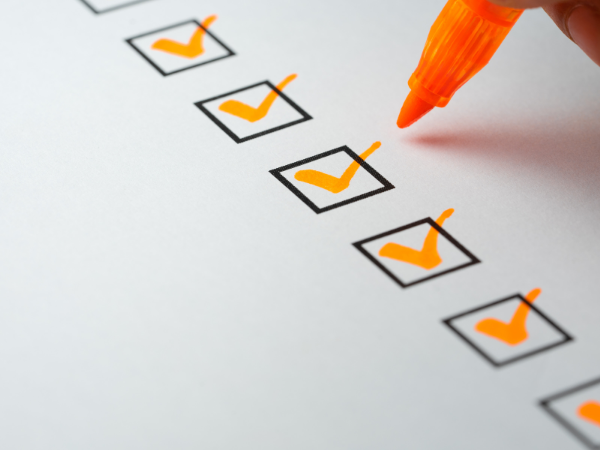
One of the most important documents that business owners use in the rental industry is a rental equipment inspection checklist. Giving a checklist to your service techs will let them know exactly what is expected of them and will ensure your equipment is always in good condition for the next customer.
But what do you include in your company's equipment inspection checklist?
Whether you're just starting out or looking to refresh your rental equipment maintenance list, we've put together a collection of what to check and when to check it.
What's included in a rental equipment inspection checklist?
Your equipment inspection checklist will look different depending on the piece of equipment being inspected. Not all the categories below are relevant to every piece of equipment. However, we've attempted to cover many parts of most equipment.
Basic Inspection
- Tires and rims
If you have a piece of wheeled equipment, it's important to make sure the tires are in good condition, their tread is not worn, their PSI is at the standard level, and their rims are undamaged. Always ensure the lug nuts are tight. - Lights
Confirm all lights on a piece of equipment are working correctly, especially if it's towable. The last thing you want is for your delivery person or renter to get pulled over for a blown out taillight. If the unit is towable, you'll also need to ensure the electrical connection to the truck or towing vehicle is working well. - Undercarriage
Do a visual inspection of the undercarriage of your equipment, removing any dirt and/or rocks and tightening or replacing any loose or dented parts.
If you're using a piece of equipment with tracks, ensure the tracks have the correct tension and are aligned. - Hydraulics
Hydraulics are a vital part of your rental equipment inspection checklist. Check the health of the hydraulic filter and change if necessary. Make sure the oil tank is filled to the recommended level, and check that the hoses aren't worn or leaking. - Lifts
If the piece of rental equipment you're inspecting has any sort of lift, make sure all the parts are intact. If it's hydraulically operated, ensure all hoses are working properly. Confirm that all areas are greased correctly and functioning smoothly. - Brakes
Check the ground and outside of the brake fluid tank to ensure it's not leaking. Check the brake fluid level of your machine and fill if necessary. Test that the brake calipers grasp tightly to ensure the unit will stop when needed while towing or in use. Checking the brakes and addressing any malfunctions ASAP is essential for avoiding lawsuits by your renters for on-the-job injuries.
Engine Inspection
- Spark plugs
If the equipment is tough to start, make sure the mechanic takes a look at its spark plug. Sometimes a simple switch of a spark plug can make all the difference in getting the equipment up and running. - Air filter
A clogged air filter can quickly lead to more major problems in your piece of equipment and potential lawsuits from customers. Verify your air filter is in good condition and replace it if necessary. - Engine oil
The quality of your engine oil should be high priority in order to maintain a smoothly running engine. To ensure the equipment will work correctly for your next customer, check to make sure it's not leaking oil and make sure there's an adequate supply of clean oil.
Cab Inspection
- Controls
Test each lever, button, switch, etc. to ensure the cab controls don't stick and aren't tough to operate, and make sure each function executes properly. - Cab interior
Stray debris in the cab is a safety hazard. Takeout containers, disposable cups, and other trash can shift under the pedals of the machine, putting the operator and everyone on the job at risk. Be sure the inside is completely cleaned out and the seats free of dirt, stones, and crumbs.
BONUS TIP: One way to go the extra mile for your customers is to sanitize the steering levers, steering wheel, console, and seat of your rental equipment. - Windows
Have your crew clean all windows on your equipment to maintain clear visibility for your next customer.
While this list is not comprehensive, we recommend checking the owners and/or service manuals of your equipment to get the specifics on what to inspect and when. If you don't have hardcopies, specific inspection lists and details should be available from the manufacturer of your equipment. For example, CAT has a list of safety checklists for their different pieces equipment available here.
How often should you inspect your rental equipment?
A piece of equipment should be inspected at the end of every rental period before it returns on the lot for rent again. Equipment inspection should be a foundational part of the routine when it's returned by your customer.
In addition, depending on customers' needs and the length of rental time, you may end up inspecting equipment while it's on the job. In this case, make sure you have a field mechanic on your team.
BONUS TIP: The better the quality of your equipment, the fewer problems you'll have. You may need to make a bigger investment upfront, but buying quality equipment for your rental fleet will save you servicing and repair expenses and reduce equipment downtime in the long run.
If you're just starting out, consider including your rental equipment inspection strategy in your rental business plan to convey your dedication to providing reliable equipment. It's an essential part of growing your rental business and increasing customer satisfaction.
Looking for low-maintenance, multipurpose equipment for your rental fleet? Take a look at Equipter's collection of high-quality self-propelled dump trailers used by professional contractors in multiple industries to manage debris, streamline production, and increase customer satisfaction.
